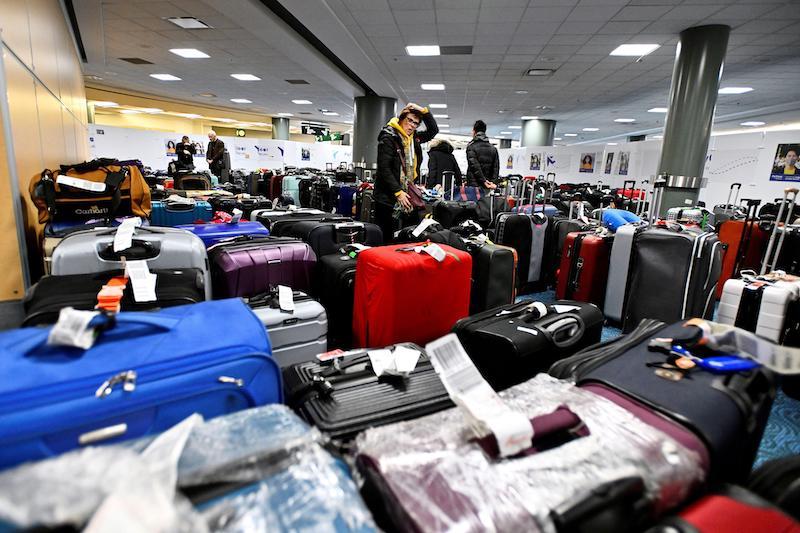
Passengers search for luggage after flight cancellations and delays caused by a winter storm at Vancouver International in December 2022.
Vancouver International Airport (YVR) has unveiled a $40 million “action plan” to avoid a repeat of the December 2022 winter-weather meltdown that led to some passengers being stuck on an aircraft on the tarmac for 11 hr. on Dec. 20.
A series of winter storms caused extensive disruptions at YVR from Dec. 17-28, with more than 1,300 flights canceled over the period. Particularly severe weather on Dec. 20 led to passengers sitting on 24 aircraft on the tarmac for at least 4 hr. One aircraft suffered an 11-hr. delay.
In an April 17 report issued by the Canadian airport, which serves as the country’s transpacific gateway, YVR officials said their review of the Dec. 17-28 period found “systematic and procedural gaps” that need to be addressed ahead of next winter.
“While the review confirms our safety promise was kept, it shows that our customer service commitment was not,” YVR CEO Tamara Vrooman says in a statement. “Passengers clearly told us that, while they recognize aviation is a complex ecosystem of different partners and players, they want YVR to take a leading role in providing more information, better access to front-line staff, and other improvements in times of extreme travel disruption—this action plan provides our road-map for doing just that.”
Among the failures, according to the YVR report, was a “heavily congested” terminal with stranded passengers who received “inaccurate and inconsistent” information. Additionally, “arriving passengers and passengers whose flights had been canceled experienced long wait times for their bags,” the report says. “Service for those with missing bags was inconsistent and information available was inadequate.”
The airport adds that it “did not provide adequate public-facing communications to convey key information to travelers and others who needed it on a consistent and timely basis.”
YVR says there “was no single root cause [of the extensive disruptions] but rather a combination of complex factors that came together to contribute to the operational challenges over a busy travel week.” The airport concedes “the systems and processes our airport community has historically relied on must be made more resilient and adaptable for more frequent and extreme weather disruptions.”
While airport officials knew winter weather was coming, they were still caught flat-footed. The report says “forecasts and subsequent updates significantly underestimated the snowfall intensity that would occur on December 20th and overestimated the intensity that would come later in the week.”
Weather included snow, freezing rain, low temperatures and fog, according to the airport’s report. “The snow and fog led to periods of much-reduced visibility, while the cold temperatures were seasonably unusual at YVR for such a sustained period,” YVR says.
The airport reports the disruptions were “essentially a case of passenger and aircraft demand exceeding processing capacity due to winter weather conditions at YVR,” adding: “This led to a cycle of delays, cancellations, queues and congestion which in turn further limited airport operations and even further limited options for travelers. The processing capacity, whether it was gates, aircraft de-icing, snow clearance, or other areas of the operation, was itself impacted by a range of factors, such as quality or accuracy of information, timely decision-making and communications across partners and agencies, and equipment availability and performance under the weather conditions.”
Going forward the airport is promising to “enhance winter and irregular operations” response with, among measures, the “installation of new real-time weather monitoring equipment, new gate protocols to ensure arriving aircraft can deplane passengers within 30 min. of taxiing off the runway, additional winter weather equipment and de-icing fluid storage capacity to meet the new realities of sustained, extreme weather events.”
Further, the airport will make sure during weather events that “additional information sharing across different airport partners” occurs, “as well as establishing a permanent team from across the airport authority to enhance decision-making and improve passenger focus.”
YVR says it will also invest in new technology for managing aircraft on the airfield, explaining this will lead to “better prioritization of aircraft on the airfield as well as an improved ability to track delayed baggage through real-time technology and data, including a new digital apron monitoring tool.”
The airport says it will train more staff “to directly support travelers using better, up-to-date information throughout the terminal 24-7.” YVR notes it will additionally improve digital communications to passengers in the terminal.
The airport says it will “commit to sharing more information more often,” adding: “We will also make better use of our website and leverage stakeholders, partners and other organizations to get people the updates they need in a more reliable and consistent way.”
